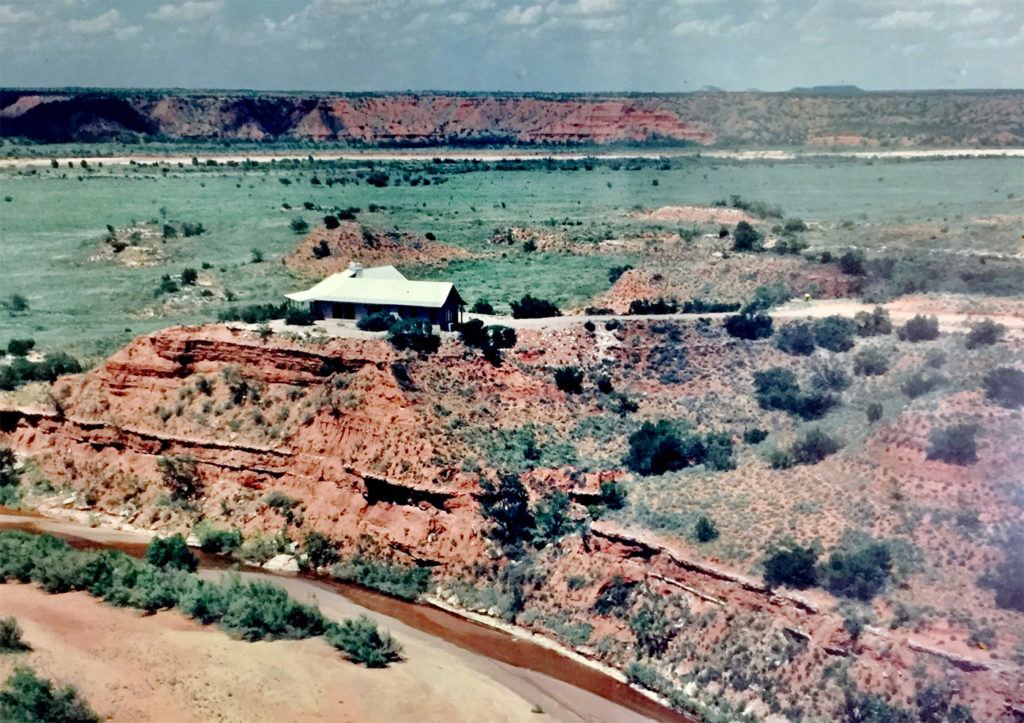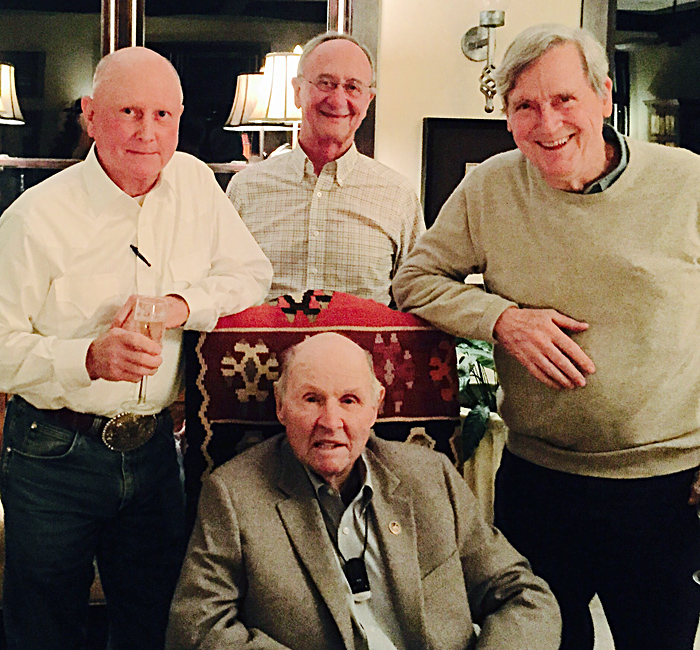The Buster and Sheila Welch Excellence in Conservation of Natural Resources Scholarship Endowment

A real estate executive, a prominent urban developer, and a former White House Deputy Chief of Staff-turned CEO walk into a barn …

Meredith McCullar, Henry Turley, and Landon Butler little suspected the enduring impact that their over two-decade partnership with legendary cutting horse trainer Buster Welch would make on their lives.
On July 12, 2022, McCullar, Turley, and Butler established the Texas Tech University “Buster and Sheila Welch Excellence in Conservation of Natural Resources Scholarship Endowment,” in memory of Buster and Sheila Welch and in honor of Buster, who passed away on June 12, 2022, at the age of 94.
It was Buster Welch’s reverence for time honored and proven ranching traditions, as well as his enthusiasm for sharing his knowledge and insight, that inspired the three men to partner with him in 25,000 acres of prime West Texas cow country called the Double Mountain River Ranch.
Meredith McCullar, a Memphis, Tenn. native, and founder of McCullar Realty Company, first met Buster Welch at 16, when he was invited by a friend to hunt quail at Buster’s ranch near Sweetwater, Texas. By the early 1980s, McCullar had become a PRCA roping champion and he and Buster, now owner of the Criswell Ranch, near Rotan, Texas, had become friends.
As McCullar recalls, it was a Sunday night phone call from Buster that ultimately led to the Double Mountain River Ranch partnership.
“Buster told me to book the first flight from Memphis and come out to Criswell Ranch headquarters as fast as I could,” said McCullar. “His neighbor had to sell his ranch as soon as he could because of a family emergency. The ranch was over 25,000 acres and had been in the Spires family for over 100 years.”
When McCullar arrived in Texas expecting to meet Mr. Spires for a tour of the ranch, Buster explained that they couldn’t go to the headquarters and see the ranch because the family was there. So McCullar would just have to take his word for everything, and that Leroy Spires was at his place in Post and they could talk with him there.
“When we got to Post, Leroy priced the ranch at $125 an acre, McCullar recalled. “We started talking and while we were talking, he kept dropping the price. He’d say, ‘I’d probably do this,’ and then we’d talk a little more and he’d say, ‘You know I might take this.’ We kept talking and finally Buster called a timeout and said to me, ‘Lets’s go outside.’ And when we got out there he said, ‘Look, you need to quit driving the price down. You’re going to make that old man mad and he’s not going to make a deal. We should go ahead and buy it.’
“It was down to $94 an acre, which was $2 million and something, when we agreed on the deal, and Leroy tore a piece of paper out of his grandson’s notebook, wrote it down, and we signed it.
“But the thing that was going to kill it for me was that I had to agree to buy Leroy Spires’ 600 head of Angus cows. They were the skinniest, sorriest looking bunch of cows I had ever seen. But Buster said he would take the cows himself, if we would lend him the $440,000 to buy them.
“So we agreed. And to prove how good a cowman Buster was, he paid off the loan with the very first calf crop.”
Before the deal was officially closed, McCullar asked his friend Ken Pritchett, an oilman and big-time bird hunter, if he would like to go in on it and he did. And Buster came aboard as soon as he was able to sell his ranch in Merkel. Later, when Pritchett developed life-threatening health issues, McCullar and Buster, bought him out, opening the way for Henry Turley and Landon Butler.
Henry Turley, Memphis, Tenn., founded his urban realty company in 1977 and also partnered with Meredith McCullar in Memphis development. Turley had never been around livestock and ranch work until McCullar took him to one of Buster’s brandings.
“Henry was like everybody else that has ever been out here,” said McCullar. “He fell in love with Buster and watching how cowboys work in big country. So he called Lanny Butler, his friend in Washington, DC, founder of Integrity Initiatives International and president of Landon Butler & Company. Butler accepted Turley’s invitation to join Buster’s spring round up and, captivated by Buster and his methods, joined the Double Mountain River Ranch partnership.
“When Buster worked cattle on the ranch, he knew every one of his cows,” explained McCullar. “And he visualized what he called a “house,” where a cow raised her calf. That was where she was most comfortable. He never believed in driving his cows into a metal pen and through a steel chute to catch the calves.
“At his roundups he drove out a cow and calf to brand, doctor, castrate or whatever else they had to do, and when they let that calf up, it would go straight back to its mother. She would calm it right back down and it was the best way to handle it for both of them. The way Buster explained it was that he made “house calls” on those mamas and babies.”
In addition to intuitive understanding and concern for his livestock, Buster Welch was also a steward of the land. Henry Turley pointed out, “When people think of Buster, they think greatest horseman, rancher, and raconteur. But going forward it may be important to remember that Buster was a pioneering ecologist before most people knew that word. He consistently moved his cattle from one piece of his country to another. He never overgrazed the grass. He cared for his land. It was precious.
“He also didn’t think of global warming, but he was attuned to the weather and aware of what was going on. When the sun peeked through a rainy sky, he’d tell of the old-timer who said, ‘I’ve seen a drought start this way.'”
Because McCullar, Turley and Butler were impressed by the way Buster Welch cared for the environment, they saw how his life’s work dovetailed with the Texas Tech Department of Natural Resources goal “to balance the current needs of people with sustainability of resources,” they set up a scholarship endowment fund and hope other admirers of Buster Welch will contribute as well.
For additional information about the Texas Tech University “Buster and Sheila Welch Excellence in Conservation of Natural Resources Scholarship Endowment” contact: Meredith McCullar or Texas Tech’s Alex Yack.
